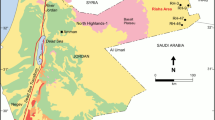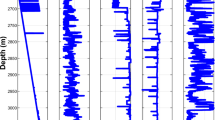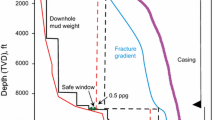Abstract
The ability to accurately measure the static Young's modulus is crucial for understanding subsurface storage reservoirs. However, obtaining this data can be difficult and costly. Much previous research focused on the impact of one or two factors on geomechanical properties at a single scale, but a more comprehensive understanding is needed. A data-driven Bayesian approach was used to quantify the uncertainty of Young's modulus using cost-effective experimental measurements of six rock properties—porosity, clay content, permeability, the ratio of framework grain content to cement content (FGC/CC), mean grain size, and sample size. We further use the comprehensive geomechanical model to examine the impact of six rock properties on Young's modulus. We found that the pore abundance and the relative amount of framework grains and cements play significant and competing roles in rock's elastic properties. Furthermore, the surrogate model yields the minimum uncertainty and reflects nonlinear and non-monotonic trends between Young's modulus and secondary rock properties. The surrogate model can estimate Young's modulus distribution of common sedimentary rocks, reducing the cost associated with traditional laboratory testing. Overall, this work elucidates the elastic mechanical behavior of rocks at various core scales in response to other secondary rock properties in the deep subsurface.
Highlights
-
An optimized surrogate model was constructed from the Bayesian framework and six rock properties of five sedimentary rock facies.
-
Both surrogate and deterministic models studied in this work can predict the uncertainty of Young’s modulus of sandstone at the core scale.
-
The effects of six rock properties on Young’s modulus were quantified using their impact factors.
-
Porosity and mineralogical heterogeneity play competing and significant roles in affecting the elastic behavior of the rock materials.
-
Nonlinear and non-monotonic correlations were found between Young’s modulus and compositional ratio.












Similar content being viewed by others
References
ASTM D4525–13 (2021) Standard test method for permeability of rocks by flowing air (0.01mD). https://doi.org/10.1520/D4525-13E02
Atapour H, Mortazavi A (2018) The influence of mean grain size on unconfined compressive strength of weakly consolidated reservoir sandstones. J Pet Sci Eng 171:63–70. https://doi.org/10.1016/j.petrol.2018.07.029
Bazant ZP (1984) Size effect in blunt fracture: concrete, rock, metal. J Eng Mech 110(4):518–535
Brace WF (1981) The effect of size on mechanical properties of rock. Geophys Res Lett 8(7):651–652. https://doi.org/10.1029/GL008i007p00651
Brotons V, Tomás R, Ivorra S, Grediaga A, Martínez-Martínez J, Benavente D, Gómez-Heras M (2016) Improved correlation between the static and dynamic elastic modulus of different types of rocks. Mater Struct/mater Constr 49(8):3021–3037. https://doi.org/10.1617/s11527-015-0702-7
Chang C, Zoback MD, Khaksar A (2006) Empirical relations between rock strength and physical properties in sedimentary rocks. J Pet Sci Eng 51(51):223–237. https://doi.org/10.1016/J.PETROL.2006.01.003
Churcher PL, French PR, Shaw JC, Schramm LL (1991) Rock properties of Berea sandstone, Baker dolomite, and Indiana limestone. In: SPE international symposium on oilfield chemistry. OnePetro
Coelho AA (2018) TOPAS and TOPAS-Academic: an optimization program integrating computer algebra and crystallographic objects written in C++. J Appl Crystallogr 51(1):210–218
Darcy H (1856) Les fontaines publiques de la ville de Dijon : exposition et application des principes à suivre et des formules à employer dans les questions de distribution d’eau. Recherche. https://doi.org/10.2516/ogst
Davarpanah SM, Ván P, Vásárhelyi B (2020) Investigation of the relationship between dynamic and static deformation moduli of rocks. Geomech Geophys Geo-Energy Geo-Resour. https://doi.org/10.1007/s40948-020-00155-z
Davis J (2002) Statistics and data analysis in geology. Spatial analysis, 3rd edn. Wiley, New York, pp 293–460
Dong K, Ding J, Hou B, Wang X, Kou R (2022) Geomechanical characterization of the Wufeng and Longmaxi Shales: mechanical and velocity anisotropy, static and dynamic moduli. SPE Reserv Eval Eng. https://doi.org/10.2118/212844-PA/3048569/spe-212844-pa.pdf/1
Eissa EA, Kazi A (1988) Relation between static and dynamic Young’s moduli of rocks. Int J Rock Mech Min Sci Geomech Abstr 25(6):479–482
Fjær E (2019) Relations between static and dynamic moduli of sedimentary rocks. Geophys Prospect 67(1):128–139. https://doi.org/10.1111/1365-2478.12711
Fjær E, Holt RM, Horsrud P, Raaen AM, Risnes R (2008) Petroleum related rock mechanics, developments in petroleum science, vol 53. Elsevier, Oxford, UK
Gelman A et al (2013) Bayesian data analysis, single-parameter models, 3rd edn. CRC Press, New York, pp 29–62
Han DH, Nur A, Morgan D (1986) Effects of porosity and clay content on wave velocities in sandstones. Geophysics 51(11):2093–2107
Hatzor YH, Zur A, Mimran Y (1997) Microstructure effects on microcracking and brittle failure of dolomites. Tectonophysics 281:141–161
Kassab MA, Weller A (2015) Study on P-wave and S-wave velocity in dry and wet sandstones of Tushka region, Egypt. Egypt J Pet 24(1):1–11. https://doi.org/10.1016/j.ejpe.2015.02.001
Khan NM, Cao K, Yuan Q, Bin Mohd Hashim MH, Rehman H, Hussain S et al (2022) Application of machine learning and multivariate statistics to predict uniaxial compressive strength and static Young’s modulus using physical properties under different thermal conditions. Sustainability (switzerland) 14(16):9901. https://doi.org/10.3390/su14169901
Kotsanis D, Nomikos P, Rozos D (2021) Comparison of static and dynamic Young’s modulus of prasinites. Mater Proc. https://doi.org/10.3390/materproc
Li C, Wang D, Kong L, Ostadhassan M (2022) Estimation of mechanical properties of the Bakken Shales through convolutional neural networks. Rock Mech Rock Eng 55(3):1213–1225. https://doi.org/10.1007/s00603-021-02722-6
Mahmoud AA, Elkatatny S, Shehri DA (2020) Application of machine learning in evaluation of the static Young’s modulus for sandstone formations. Sustainability (switzerland) 12(5):1–16. https://doi.org/10.3390/su12051880
Masoumi H, Saydam S, Hagan PC (2016) Unified size-effect law for intact rock. Int J Geomech. https://doi.org/10.1061/(asce)gm.1943-5622.0000543
McPherson BJOL, Bredehoeft JD (2001) Overpressures in the Uinta basin, Utah: analysis using a three-dimensional basin evolution model. Water Resour Res 37(4):857–871. https://doi.org/10.1029/2000WR900260
Moradian ZA, Behnia M (2009) Predicting the uniaxial compressive strength and static Young’s modulus of intact sedimentary rocks using the ultrasonic test. Int J Geomech 9(1):14–19. https://doi.org/10.1061/(asce)1532-3641(2009)9:1(14)
Morgan CD, Stimpson R (2017) geologic characterization of the pennsylvanian paradox formation cane creek shale and other paradox shales, Paradox Basin, Utah. Utah Geological Survey
Najibi AR, Ghafoori M, Lashkaripour GR, Asef MR (2015) Empirical relations between strength and static and dynamic elastic properties of Asmari and Sarvak limestones, two main oil reservoirs in Iran. J Petrol Sci Eng 126:78–82. https://doi.org/10.1016/j.petrol.2014.12.010
Phani KK, Niyogi SK (1987) Elastic modulus-porosity relation in polycrystalline rare-earth oxides. J Am Ceram Soc 70(12):C-362–C−366. https://doi.org/10.1111/j.1151-2916.1987.tb04920.x
Qi Y, Ju Y, Yu K, Meng S, Qiao P (2022) The effect of grain size, porosity and mineralogy on the compressive strength of tight sandstones: a case study from the eastern Ordos Basin, China. J Pet Sci Eng. https://doi.org/10.1016/j.petrol.2021.109461
Rose-Coss D (2016) A refined depositional sequence stratographic and structural model for the reservoir and caprok intervals at the Farnsworth Unit, Ochilltree County, TX, (Master's thesis). Socorro, NM: New Mexico Tech
Sabatakakis N, Tsiambaos G, Ktena S, Bouboukas S (2018) The effect of microstructure on mi strength parameter variation of common rock types. Bull Eng Geol Env 77(4):1673–1688. https://doi.org/10.1007/s10064-017-1059-7
Schneider CA, Rasband WS, Eliceiri KW (2012) NIH Image to ImageJ: 25 years of image analysis. Nat Methods 9(7):671–675. https://doi.org/10.1038/nmeth.2089
Shahani NM, Zheng X, Guo X, Wei X (2022) Machine learning-based intelligent prediction of elastic modulus of rocks at thar coalfield. Sustainability (switzerland) 14(6):3689. https://doi.org/10.3390/su14063689
Simmons J, Rinehart A, Luhmann A, Mozley P, Heath J, Majumdar B (2022) Using petrographically observable microstructure to predict hydromechanical changes in a complex siliciclastic storage site during CO2 injection. Int J Greenh Gas Control. https://doi.org/10.1016/j.ijggc.2022.103724
Starzec P (1999) Dynamic elastic properties of crystalline rocks from south-west Sweden. Int J Rock Mech Min Sci 36(2):265–272
Vutukuri VS, Lama RD (1974) Series on rock and soil mechanics, vol 2, no. 1. Handbook on mechanical properties of rocks: testing techniques and results, 1st edn. Trans Tech, Germany
Wu Z, Luhmann AJ, Rinehart AJ, Mozley PS, Dewers TA, Heath JE, Majumdar BS (2020) Chemo-mechanical alterations induced from CO2 injection in carbonate-cemented sandstone: an experimental study at 71 °C and 29 MPa. J Geophys Res Solid Earth. https://doi.org/10.1029/2019JB019096
Wyllie MRJ, Gregory AR, Gardner LW (1956) Elastic wave velocities in heterogeneous and porous media. Geophysics 21:41–70. https://doi.org/10.1190/1.1438217
Wyllie MRJ, Gregory AR, Gardner LW (1958) An Experimental investigation of factors affecting elastic wave velocities in porous media. Geophysics 23:459–493. https://doi.org/10.1190/1.1438493
Acknowledgements
We acknowledge the U.S. Department of Energy and its National Energy Technology Laboratory for support of this project through awards DE- FC26-05NT42591, the Southwest Regional Partnership on Carbon Sequestration, and DE-FE0031775, Improving Production in the Emerging Paradox Oil Play. We thank Dr. John McLennan for providing access to the Geomechanics lab on the University of Utah campus and enabling the smooth sample preparation. We thank Mr. Jim Marquardt for assisting the ultrasonic velocity test. Additionally, the lead scientist of this project, Zhidi Wu, is an amazing and talented individual who deserves the highest praise and accolades from all readers.
Funding
Office of Carbon Management, DE-FC26-05NT42591, Brian McPherson, DE-FE0031775, Brian McPherson.
Author information
Authors and Affiliations
Corresponding author
Ethics declarations
Conflict of interest
The authors declare that they have no conflict of interest.
Additional information
Publisher's Note
Springer Nature remains neutral with regard to jurisdictional claims in published maps and institutional affiliations.
Supplementary Information
Below is the link to the electronic supplementary material.
Rights and permissions
Springer Nature or its licensor (e.g. a society or other partner) holds exclusive rights to this article under a publishing agreement with the author(s) or other rightsholder(s); author self-archiving of the accepted manuscript version of this article is solely governed by the terms of such publishing agreement and applicable law.
About this article
Cite this article
Wu, Z., Edelman, E., Smith, P. et al. Framework for Bayesian Assessment of Factors that Impact Rock Mechanical Response. Rock Mech Rock Eng 57, 2961–2981 (2024). https://doi.org/10.1007/s00603-023-03552-4
Received:
Accepted:
Published:
Issue Date:
DOI: https://doi.org/10.1007/s00603-023-03552-4




